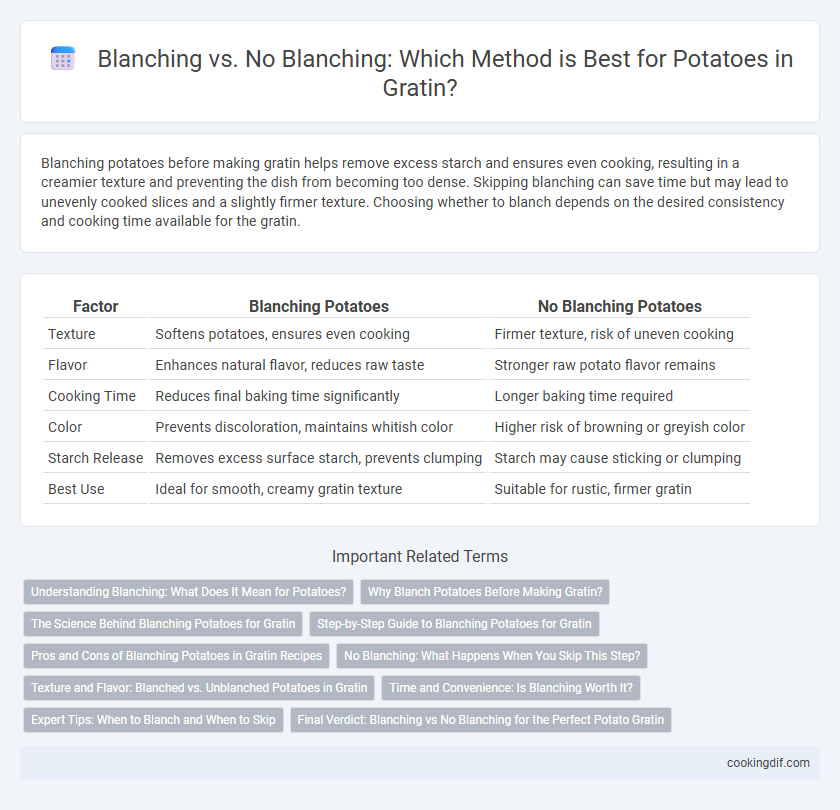Blanching potatoes before making gratin helps remove excess starch and ensures even cooking, resulting in a creamier texture and preventing the dish from becoming too dense. Skipping blanching can save time but may lead to unevenly cooked slices and a slightly firmer texture. Choosing whether to blanch depends on the desired consistency and cooking time available for the gratin.
Table of Comparison
| Factor | Blanching Potatoes | No Blanching Potatoes |
|---|---|---|
| Texture | Softens potatoes, ensures even cooking | Firmer texture, risk of uneven cooking |
| Flavor | Enhances natural flavor, reduces raw taste | Stronger raw potato flavor remains |
| Cooking Time | Reduces final baking time significantly | Longer baking time required |
| Color | Prevents discoloration, maintains whitish color | Higher risk of browning or greyish color |
| Starch Release | Removes excess surface starch, prevents clumping | Starch may cause sticking or clumping |
| Best Use | Ideal for smooth, creamy gratin texture | Suitable for rustic, firmer gratin |
Understanding Blanching: What Does It Mean for Potatoes?
Blanching potatoes involves briefly boiling them before baking, which enhances texture by partially cooking the starch and preventing the gratin from becoming soggy. This process helps retain the potatoes' shape, reduces cooking time, and improves the overall creaminess of the dish. Skipping blanching may result in unevenly cooked layers and a denser gratin texture.
Why Blanch Potatoes Before Making Gratin?
Blanching potatoes before making gratin helps remove excess starch, resulting in a creamier and smoother texture. It also partially cooks the potatoes, ensuring even doneness and preventing a raw taste in the final dish. This step enhances the overall flavor absorption and reduces baking time, making the gratin more tender and flavorful.
The Science Behind Blanching Potatoes for Gratin
Blanching potatoes before making gratin helps remove excess starch, resulting in a creamier texture and preventing the dish from becoming overly gummy. The process involves briefly boiling potatoes and then shocking them in cold water, which also partially cooks the potatoes, ensuring uniform doneness during baking. This scientific step enhances the final gratin by improving layering, texture, and overall flavor absorption.
Step-by-Step Guide to Blanching Potatoes for Gratin
Blanching potatoes for gratin involves boiling sliced potatoes in water at 190degF to 200degF for 3 to 5 minutes before baking, which helps reduce cooking time and ensures even texture. This step removes excess starch, preventing the gratin from becoming gummy while promoting a tender yet firm bite. Skipping blanching may result in uneven cooking and a less creamy consistency in the final dish.
Pros and Cons of Blanching Potatoes in Gratin Recipes
Blanching potatoes before making gratin helps reduce cooking time and achieve a tender texture, enhancing overall dish consistency. It also minimizes the risk of undercooked centers and can promote better flavor absorption from creams and cheeses. However, blanching may lead to slight nutrient loss and extra preparation steps, which could affect the dish's richness and increase cooking complexity.
No Blanching: What Happens When You Skip This Step?
Skipping blanching in gratin preparation results in potatoes that release more starch, causing the dish to become denser and potentially gummy. Without blanching, potatoes retain more raw flavor and firmer texture, which may increase baking time to ensure even cooking. The absence of this step can lead to less creamy consistency, affecting the overall smoothness of the gratin.
Texture and Flavor: Blanched vs. Unblanched Potatoes in Gratin
Blanching potatoes for gratin enhances texture by partially cooking and softening the slices, ensuring an evenly tender result without mushiness. Unblanched potatoes retain a firmer bite and a more pronounced earthy flavor, which can add textural contrast in the gratin. Choosing blanching or not alters the balance between creamy softness and rustic texture while influencing the subtle nuances of potato flavor in the final dish.
Time and Convenience: Is Blanching Worth It?
Blanching potatoes for gratin reduces cooking time by partially cooking the slices, ensuring a tender interior while achieving a golden crust faster. Skipping blanching simplifies preparation and saves upfront effort but may extend baking time and risk uneven texture. Choosing blanching improves consistency and speed, making it worth the extra step for those prioritizing time and convenience in potato gratin preparation.
Expert Tips: When to Blanch and When to Skip
Blanching potatoes before making gratin helps remove excess starch, ensuring a creamy texture and even cooking, especially for thicker slices or denser varieties like Yukon Gold. Expert tips recommend skipping blanching for thinly sliced, waxy potatoes such as Red or Fingerlings, which cook evenly without becoming mushy. Knowing the potato type and slice thickness guides whether blanching enhances flavor and texture or if it can be omitted for a quicker preparation.
Final Verdict: Blanching vs No Blanching for the Perfect Potato Gratin
Blanching potatoes before making gratin enhances texture by partially cooking and removing excess starch, resulting in a creamier, more tender dish. Skipping blanching preserves more potato flavor and allows for a firmer bite, but may require longer baking to achieve softness. For perfect potato gratin, blanching is recommended to balance tenderness and consistency while preventing watery or unevenly cooked layers.
Blanching vs No blanching for potatoes Infographic

 cookingdif.com
cookingdif.com